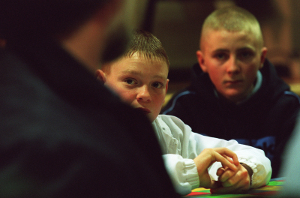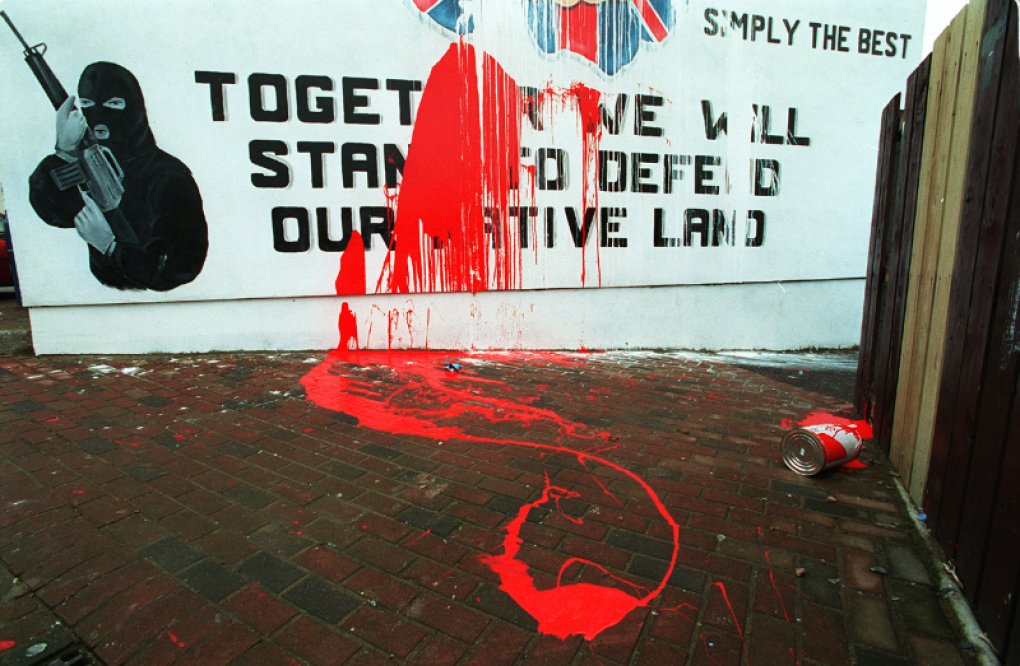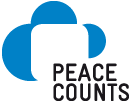Northern Ireland: The Cold Peace
 by Michael Gleich
by Michael Gleich
Photos: Uli Reinhardt
On 10th of April 1998, the combatants in Northern Ireland signed the Good Friday agreement. Two former terrorists stayed on the street, continuing the struggle – as social workers. They try to convince young people to stay out of paramilitary groups. The task is challenging. The hatred between Catholics and Protestants has not faded.
During the “Troubles,” Joe Doherty and Peter McGuire probably never met. And probably they’re better off that way – a meeting could have had fatal consequences.
Tonight Joe is running the youth center in New Lodge, a Catholic section of Belfast. He casually tolerates a noise level only teenagers could produce. There is yelling from the gym where the boys are playing soccer, disco beats from the foyer where the girls hang out, and in the middle the 48-year-old, relaxed enough, if still somewhat a stranger to youth culture. Cell phones that never stop ringing, greenish potato chips for supper, padded sneakers – exotic things conquered the streets of New Lodge in the years Joe spent in prison. Another thing he finds strange is peace. He has no experience with it. He knows all about struggle and imprisonment. But peace? That takes some getting used to.
When he was the same age as the kids in the center, he was already spying for the IRA. He observed and reported the movements of British troops. In return, the British sent tear gas squadrons into his street, stormed his house during the night, and beat his parents. Joe was proud that the information he provided helped in the planning of ambushes. “We thought we could drive the British out.” At 17 he became what he called a soldier. The British called him a terrorist. When a police patrol caught him with explosives in his car, he was sentenced to 12 years. He served eight and came out in his mid-20s filled with thoughts of revenge, a living time-bomb. He began planning his first murder.
Twenty-one years later, he is fighting to stay on course. His existence is in transit, somewhere between the old Northern Ireland and the new, between underground fighter and social worker. Peter McGuire took a similar track on the Protestant side. He, too, swore off terror and turned to youth work. The kinks in their two biographies reflect the transformation that the entire country has gone through. Internal contradiction is one of the few constants in Northern Irish society. The IRA, the British army, and the Protestant paramilitaries may have made peace, but the agreement repeatedly threatens to give way.
Social tension is heightened by the uneven distribution of the peace dividend. The middle class has profited, but the large working class feels the agreement has brought them no benefits. As in many extended conflicts, especially those where the conflict has gone on for hundreds of years, everyone is a victim. The 35 years of the “Troubles,” the locals’ euphemistic term for their civil war, have taken nearly 4000 lives. Almost every family has a victim in its ranks. The dead are lionized. The perpetrators are all on the other side. The Good Friday agreement six years ago created a tentative “Cold Peace” on paper, but in the hearts and minds of many in Northern Ireland, the war is still going on.
“Hey Joe,” the kids beg in the youth center. “Tell us your war stories!” They want tales of heroism. Joe once killed an enemy. He fought for freedom. He went to jail, broke out, fled to the U.S., was apprehended. A mural in New Lodge Road shows him three times life size. He is a “cool freak.” That means, roughly, a hero.
“Don’t believe all that.” Joe fends off the compliments. It was a sad, dirty war. His thoughts return again and again to the dead man who changed his life. His name was Richard Westmacott, a British captain turned loose on the IRA with a mandate to kill. On May 5, 1980, he died, shot to death at 28 on the street not far from where the youth center is now. One of his three assailants was Joe Doherty.
It was never determined who fired the bullet that penetrated Westmacott’s forehead. “We were all responsible,” says Joe. Does he regret it? “I’m sorry for everyone who had to die. But this man had been given a gun and sent to Northern Ireland to shoot at us. I didn’t have to travel to find the war. The war came to me.”
Joe Doherty’s feet are leaden. He feels the weight of his back, his head. It was a long day, as usual. The morning was spent providing counseling in his office, the afternoon handing out flyers in the neighborhood – a tribunal against the British Army and could everyone please attend. And in the evenings in the youth center. He has no paid overtime. “Want to know what I dreamed of when I was your age?” The kids are eager to find out. “I wanted to be a plumber. Flanging, welding, that was fun. A plumber, that would have been it.” The teenagers nod. Learning a trade is little more than a fantasy for most in New Lodge.
Young people growing up in poor Catholic sections of Belfast have little to expect from the future. Most drop out of school. Apprenticeships are rare, unemployment high. In the summer, when the schools are closed and there’s nothing else to do, the kids of New Lodge carry on the war. Their target: Protestants, one neighborhood over. They gather on the border to beat each other up. Then the rocks fly, and sometimes Molotov cocktails. Joe Doherty calls it “recreational rioting.” The devil finds work for idle hands. He knows from experience how easily a fistfight can escalate into a shooting. “The youth on both sides are at risk of drifting into the paramilitary scene.” He wants to help stop them. That motivates his overtime work.
“When I was in jail, my parents wrote me that a lot of kids were just hanging out on street corners, taking drugs and making trouble. It was then that I knew what I wanted to do when I got out.” In 1999, a year after the Good Friday agreement, he emerged from prison. The IRA had abandoned terror. Its leadership was betting on peaceful change through its political wing, Sinn Fein. “Our goal was always to give Catholics in Northern Ireland a fair chance,” says Joe. His current work with at-risk youth gives meaning in retrospect to the armed struggle. Sticking to the party line, he wants to liberate kids from the cycle of violence, not by preaching, but with tangible help – computer courses, step dancing, trips out of the neighborhood to go swimming, job application training, soccer with the boys. He finds them on the street and brings them inside, away from the influence of underground groups.
The underground lures youth with adventures unattainable by legal means: money, flexible hours, willing women, and the sense of power conferred by carrying a gun. Compared with unemployment, the paramilitary can seem an attractive career. The risk of death is balanced with the glory of dying for a free Northern Ireland – or for Great Britain. The choice of heavens is left to the recruit.
One of the boys curses. “Joe, you fought in the war, and now you don’t even let us beat up Protestants.” Joe’s strongest argument is his biography. When he says armed struggle gets you nowhere, he speaks with the authority of a man who knows dead ends. The hope of repulsing the British with terror was a dead end. Every fellow fighter’s grave was one, as was his prison cell. There are around 100,000 former prisoners in Northern Ireland, a sad army of unemployed and often homeless men, impoverished and traumatized. They complicate the peace. Joe found his way out of the dead end, through social work with youth. That earns him high respect.
A terrorist as angel of peace? Tales of overnight conversions, from Saul to Paul, are rare in Northern Ireland. The borders are flexible. Joe maintains contact to the IRA. His attitude toward the peace is one of cool calculation. He tells the Catholic kids not to provoke “the others,” but he doesn’t preach nonviolence: “If they attack, you have to defend yourselves.” He never again wants to see Catholics persecuted. At the same time, he fears the “Troubles” could flare up again.
He shares such worries with Peter McGuire, his counterpart in the Protestant camp. The two have presumably never met – or at least, not that they know. It’s a shame. They’d have plenty to tell each other. Joe fought on the Catholic side, Peter for the Ulster Volunteer Force (UVF). Joe did time for murder. Peter was never charged with anything of that caliber, but did ten years for an assortment of other offenses. And today both are youth social workers. Their lives are like two parallel lines that can never meet. An unwritten law keeps them apart. It says Northern Irish are born into one of two factions. There they will live and die, and that’s all there is to it.
Peter McGuire hates dogma and thought-censorship. “I’ve always spoken my mind and always gotten hit for it,” he says. Red-faced, with a full, soft mouth and wire-rimmed glasses, he looks at 37 more like a high-church pastor than how one would imagine a terrorist. His hands betray his inner tension. When he thinks, he presses his fingers together until his knuckles are white. He thinks a lot – about children burned alive because they were baptized in the wrong religion, about kidnappings and assaults in which he himself participated. He thinks about his “career as a terrorist,” as he calls his early years. The thoughts crowd each other, some crowd each other out, and he seems to be trying to hold them together with his hands. It takes work. It’s hard to imagine that this thoughtful man has attacked and threatened people, tied them up, held them captive.
When did he go straight? Did he receive enlightenment? A Buddhist friend in the peace movement really did ask him that once. The standard tale of the bad kid who sees the light would have fit the picture, but he says no, there was no aha-eureka-experience. But there were situations that led him to doubt the value of guerrilla war. His group threw firebombs into a Catholic house. Three children died in the flames. “That shocked me. They could have been our children. What did they have to do with the Troubles?”
Not long after, the UVF leadership passed a death sentence on a comrade. Peter was given the job of luring him into the woods and shooting him. “He came along, even though he knew what was happening. I asked him why, and he said that if they excommunicated him he couldn’t survive in Northern Ireland anyway. He was in total despair.” It was a passive suicide. Peter couldn’t pull the trigger. He told the man to leave the country, and asked himself what the war had turned him into. As an adopted child, pushed back and forth between stepparents and stepsiblings, there was always one thing he wanted: “Control over my own life.” But he was caught up in the whirl of events. Others decided how he would live, demanded even that he kill a comrade. That was in 1997. Since then he has left the UVF, step by step.
Today he propagates a political solution to the conflict. The Good Friday agreement was not a defeat, as many Loyalists took it to be. “Our strategic goal was to live normally. Well, the British soldiers have gone back to their barracks and the IRA has scrapped most of its weapons. We won our normality. And with that, we won the war.”
With this view, exotic in Loyalist circles, Peter McGuire confronts the youth who attend his seminars. Even worse: He collaborates with the enemy. He invites Catholics to present their own view of history and of the present. At first, the kids are shocked. Then come the questions. In the end, their frozen ideas begin to soften. Peter has been organizing such “critical dialogues” for more than four years. His target is youth who are wavering on the fringes of the paramilitary scene. “I’m not trying to turn ‘bad’ people into ‘good’ people. But we try to make clear that they have alternatives.” He counts every youth who leaves the scene after one of his seminars as a personal achievement.
Peter McGuire and Joe Doherty eventually did meet up. Peace Counts invited them to take part in a public discussion in Berlin. They talked all day and all night. Former enemies, with similar careers, both stand insecurely on the threshold of a new life. Peter has begun to study social work. Joe wants to start a family, at an age when many already have a house and children. Both are starting from scratch. That is perhaps the most difficult struggle yet. What each hopes to gain is something many don’t even think of wishing for: a normal life.


